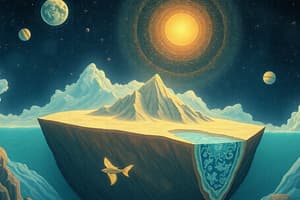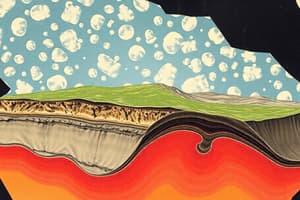Podcast
Questions and Answers
Which layer of the Earth's interior do tectonic plates float on?
Which layer of the Earth's interior do tectonic plates float on?
- Crust
- Core
- Mantle (correct)
- Atmosphere
What are the three different ways in which plates interact at plate boundaries?
What are the three different ways in which plates interact at plate boundaries?
- Separate, converge, rotate
- Separate, collide, slide (correct)
- Combine, converge, rotate
- Combine, divide, shift
What is the driving force behind the separation of plates at constructive or divergent boundaries?
What is the driving force behind the separation of plates at constructive or divergent boundaries?
- Friction
- Magnetic fields
- Gravity
- Convection currents (correct)
What type of rock is formed when magma rises to the surface and cools and solidifies?
What type of rock is formed when magma rises to the surface and cools and solidifies?
What is the mid-atlantic ridge?
What is the mid-atlantic ridge?
Flashcards
Which Earth layer do tectonic plates float on?
Which Earth layer do tectonic plates float on?
The layer of the Earth's interior on which tectonic plates float.
Plate interaction types at boundaries?
Plate interaction types at boundaries?
Plates either move apart, they collide, or they slide past each other.
Driving force behind plate separation?
Driving force behind plate separation?
The separation of plates at constructive or divergent boundaries is largely due to the process of Convection currents.
Rock formed from cooled magma?
Rock formed from cooled magma?
Signup and view all the flashcards
What is the Mid-Atlantic Ridge?
What is the Mid-Atlantic Ridge?
Signup and view all the flashcards
Study Notes
Earth's Interior
- Tectonic plates float on the Asthenosphere, the upper part of the Earth's mantle.
Plate Interactions
- At plate boundaries, plates interact in three different ways:
- Convergent (colliding), where plates move towards each other and can result in subduction or collision.
- Divergent (separating), where plates move apart from each other and new crust is formed.
- Transform (sliding), where plates slide past each other horizontally.
Plate Separation
- The driving force behind the separation of plates at constructive or divergent boundaries is convection currents in the Earth's mantle.
Rock Formation
- Igneous rock is formed when magma rises to the surface and cools and solidifies.
Mid-Atlantic Ridge
- The Mid-Atlantic Ridge is a divergent boundary where the North American and Eurasian plates are moving apart, and new oceanic crust is being created through volcanic activity.
Studying That Suits You
Use AI to generate personalized quizzes and flashcards to suit your learning preferences.




